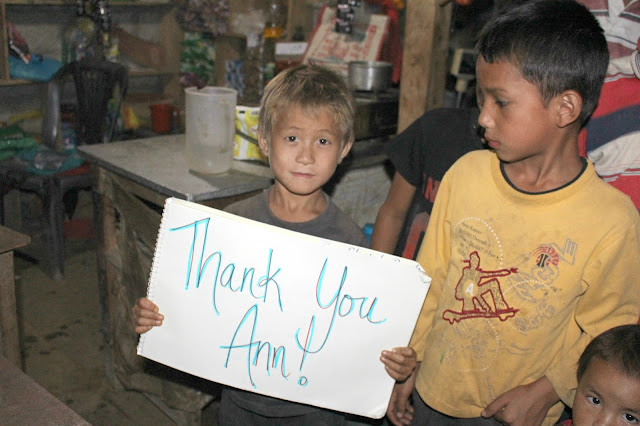Lotus Sky's "It's All About the Tin" Journey!
Posted on July 08 2015
On Tuesday, Lotus Sky loaded 880 pieces of large roofing tin into two trucks in preparation for a delivery to the 1200 people in the village of Raniban. Raniban is a nearly inaccessible place, down the mountainside from Nagarkot, and difficult to reach in the best of times via a cliff-hanging “road,” peppered with large rocks. In the monsoons, this “road” becomes a slippery, sinking, landslide prone cesspool that takes one thousand and one prayers to navigate without going over the edge. Getting stuck is a given.
We got to Nagarkot, racing up the hairpin turns to the mountaintop. Then we reached the path down the mountain to the village. We knew the going would be difficult. We have taken this path many times on foot, on motorbike, on truck. It is inevitably a jolting, dangerous, and trying journey every time. It is not one of those things that gets easier.
Twenty minutes down the cliff, the driver cursing and spewing, the wheels spinning in desperate hope for traction, the monsoon rains let loose. And, like that, the road turned to quicksand. Loaded down with our tin, even with the weight distributed between two trucks, we were sinking like destroyed battleships.
Then began the process of “building the road.” With shovels, hands, and feet, the ground around the wheels was loaded with rocks, gravel, grass, leaves. Back the truck up and try to gun it over the mudslide. In this way, we haltingly proceeded down the mountainside. By 5 PM, we made it to a Nepali Army camp, about halfway to Raniban. With the realization that night would soon settle like a thick, impenetrable blanket over the mountain and with the fog creeping steadily closer like a predator on the hunt, we decided that the Army camp would have to serve as the official distribution site.
The villagers waiting at the Raniban store were summoned to send one family representative to collect their share. With the tin trucks parked inside the camp, we devised a system to let one villager in at a time, writing the number of tin pieces they were to receive on their hand for display to two army officials who helped hoist and balance the 12 foot long pieces of tin on the villagers' heads. Sangye checked off each family from her census list as they were called.
It was at this point that I got the bright idea to go down to the village to check on the children. An hour later after a harrowing slide down the path in near pitch blackness, I made it to the village center where I shared tea and biscuits with some of our sponsored children and took a few photos- a game for the children that they love.
With the time nearing 8:30 and the Army deciding to halt distribution until the following day for the sake of safety, my return to the camp was possible only by motorbike. One of our village contacts volunteered to drive me on his bike. Into the blackness we plunged, guided only by a single beam of headlight, the sounds of the forest alive, like thick, buzzing velvet around us. Yes, we fell twice. I was thrown of the bike. We were trapped in mud. We stalled out. But in thirty minutes we were back at the camp and Sangye's voice delivered the realization that I was still alive, disoriented and stumbling as I was.
Back in our truck, we began a slow climb back upward, weighting the back of the trucks down with large rocks to even out the weight distribution. Sputtering, groaning, in agony, our truck was like a woman in childbirth. Our driver was similarly overcome- using the full weight of his body to muscle the truck around curves as the edges of the wheels kissed the cliff edge, sending mud and debris tumbling downward.
Halfway up we got stuck. Really stuck. 4 hours in a downpour in rural night blackness at 10 PM stuck. Now is the time to pray and ask for forgiveness stuck.
“Building the road” again resumed, this time by cell phone light, hurling moss, sticks, stones, and gravel in front of the wheels, trying to give them something to grasp. We live in a world where a person can get from LA to Shanghai in perfect comfort and in less than a day, and it is easy to forget that in some places, a few kilometers can be nearly impossible.
By midnight we had gotten one truck up to Nagarkot and given up on getting the second truck up. The driver decided to stay with his truck, bracing the wheels with rocks, and settling into the interior for the night with no food, hungry till morning. Sangye and I headed back to Boudha with the other driver, finally reaching our homes around 3 AM.
We made the journey, but we owe our thanks to all of the generous people who made it possible for us to buy the 880 sheets of tin for the villagers of Raniban. Imagine that for around $50, a whole bundle of tin with eight 12 by 4 foot sheets of tin can provide a family with shelter from the rain and wind! $50 might be a tank of gas in America, but for the villagers of Raniban, it is utterly transformative. Thank you so much to all of those from near and far who made this phase of Lotus Sky's relief work possible. You have changed lives.



0 comments